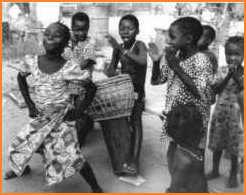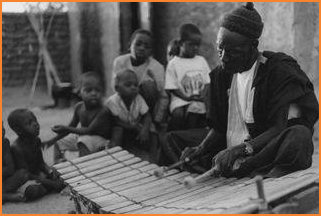
Kiemogo and Kalifa Kone play jembe drums while their brother Bureima claps for neighbor Zalisa as she dances the fiyen ka bo (“the air must exit”) dance.
NEW “chapterized” DVD feature-length version—with 84 chapters
—now available!
DVD. Color. 104 minutes.
Subtitled in English:
Five languages (Jula, Bamana, Bwamu, Moore & French) spoken in Film.
Originated on 16mm color film. First released on VHS video.
Producer, Director, Cinematographer: Taale Laafi Rosellini
Principal Sound Recordist: Boyo Roger Siene
Additional Sound Recordist: Kathleen Ann Johnson
Editors: Ron Mulvihill, Jerry Weissman, Taale Laafi Rosellini
Filmed over a span of two decades, Great Great Great Grandparents’ Music presents an intimate portrait of the remarkable Kone family, three generations of jeli (West African musicians-singers-dancers and carriers of collective knowledge and culture). The film focuses on this ancient system of cultural transmission through sharing, respect and humor.
Children learn music, song, oral history, hair braiding, the construction of musical instruments, the origin of music and braiding, and the philosophy of life, passed down from their parents, grandparents and ancestors. Filmed in the capital city of Ouagadougou, Burkina Faso.
- Awards, Premieres and Synopsis
-
- Prix Spécial Award, FESPACO (Festival Panafricain du Cinéma de Ouagadougou), the biggest Black film festival in the world. Awarded by Ousmane Sembene, internationally acclaimed author and filmmaker, Jury President.
- U.S. Premiere, National Museum of African Art, Washington, DC
- West Coast Premiere, Cascade African Film Festival, Portland, OR
- Best Documentary Nomination, Los Angeles PanAfrican Film Festival, the biggest Black film festival in the US.
Great Great Great Grandparents’ Music brings to the fore the role of the family in the lives of traditional jeli (West African praise-singers and carriers of collective knowledge and music). Focusing on this ancient system of cultural transmission, the film is a vivid celebration of music and oral history, a heritage of major importance in Africa — and by extension, America.

Grandfather Wamian Kone plays the bala xylophone for his grandchildren and friends.
Driven from their ancestral homes in rural Mali by the onslaught of successive droughts, the Kone family now resides at the outskirts of Ouagadougou, a modern African city caught in the throes of tremendous change. One is witness to their persistence to maintain traditional identities and values amidst the chaotic transformations of the late 20th century. The Kone family are culture carriers par excellence. They are jeli who preserve and transmit their people’s history through songs recited to bala (talking xylophones) and drums which they construct and repair themselves.

Dugutigi Kone teaches his son Dramane, to play the bala xylophone. At age 4, Dramane already speaks three languages: Bwamu, Jula and Moore.
At the heart of the film is the knowledge of the bala xylophone as microcosm of the universe. The proper playing of the bala achieves a world in balance and a life well-spent. The film’s protagonists, Grandfather Ouamian and his extended family of musicians and singers (men, women and children), speak to the camera of their métier and their calling.
The Kones retell their origins in epic narratives: how the bala xylophone first came to the village; how a bird brought the first song to humankind; and how the braiding of hair mimics the natural world. Parents and children partake in the cooking of food, the working of leather, and the making of bala, jembe (conical drums) and bara (gourd drums). The Kone children are active, tending to the babies, gathering wood, washing, reading and studying for school, braiding hair, repairing old musical instruments and building new ones from tree branches, goat hide and gourds. On occasion the family performs for the community at festivals, name-giving celebrations and marriages.
African children assume center stage, growing up in front of the camera over two decades with dignity, shared love and a strong sense of identity. The children attend school and discuss their future. The elders worry about changing times and transmit their wisdom to the youth. Confronted with the pressures of technological and sociological change, the family struggles to remain at one with the labor of love which is their heritage. Great Great Great Grandparents’ Music is an upbeat yet honest look at a family of African artists and how knowledge is passed from generation to generation.
NEW “chapterized” DVD feature-length version—with 84 chapters—now available!
Purchase Now!
For Personal Viewing (Does not include performance rights):
$35
For Public Libraries (Does not include performance rights):
$90
For Educational Institutions (Includes performance rights for class or group screenings):
$340

 Follow
Follow